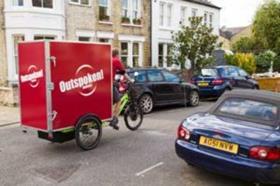Outspoken Delivery is to hire out electric-assist cargo bikes in Norwich and Cambridge following a government initiative to boost the uptake of electric bikes in the UK.
The cycle logistics firm’s fleet of electric cargo bikes will be available for use by local businesses and individuals outside of its peak operational times. Typically this would be late afternoon, evenings and weekends.
Rob King, director of Cambridge-based Outspoken, said: “This is a fantastic opportunity to allow members of the public to see the many benefits of using an electric-assist cargo bike. It might be individuals doing the weekly shop, or businesses with small local delivery needs that will be able to take advantage of this without some of the issues of high capital costs or storage.”
The scheme should be operational by the end of the year and will be offering three types of cargo bike:

- The Radkutsche Musketier (right)– a cargo trike that can carry up to 300kg. The company said this “awesome bike can carry large loads and operates like a small van”. Target users include students moving the contents of their flats to local businesses having small deliver needs.
- Butchers & Bicycles cargo trike - straight out of Copenhagen, Outspoken said this trike leans around corners and is ideal for doing the shopping, taking the kids on the school run or delivering a round of magazines.
- Maderna Truck - the truck is a two-wheeled cargo bike that is ideal for smallish loads of up to 100kg. Outspoken said it would be a good fit for doing the weekly shop or for a businesses looking to trial using a cargo bike for their own operation.
Outspoken’s scheme is one of 11 winning projects selected for the Carplus Shared Electric Bike Programme, funded by the Department for Transport, that will put 200 new electric bikes into the public domain. The project will follow the development of new projects to investigate the potential for shared electric bikes to:
- Help more people make door-to-door journeys on shared and public transport;
- Reduce congestion, demand for parking and pressure on the transport system;
- Reduce pollution, CO2 emissions and improve air quality;
- Encourage more people to try or return to cycling, and for people to cycle more often;
- Improve health and well being, whilst stimulating community cohesion.













![DP World Modal Shift Programme Image[72690]](https://d2cohhpa0jt4tw.cloudfront.net/Pictures/100x67/4/9/7/17497_dpworldmodalshiftprogrammeimage72690_781836.jpg)
